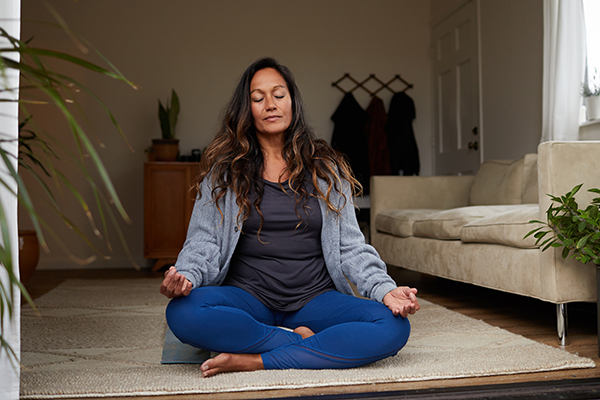5 Reasons to Practice Meditation Right Now

If this chaotic year has shown us anything, it’s that self-care and mindfulness are absolutely necessary for our well-being.
We’re all dealing with social distancing, stressful news headlines, and the struggle of trying to maintain a work-life balance while at home.
The stressors of this year have been no joke — and that means there’s no better time to take up a meditation practice.
The benefits of meditation are plentiful, and you can reap those rewards every day.
Here are five reasons to meditate right now to help ease your daily stress and anxiety.
1. Meditation Provides a Mini Media Break
Even if you meditate for only a few minutes each day, it offers a reprieve from constantly refreshing the news or scrolling through social media.
Meditation forces you to turn off your devices, take some deep breaths, and focus on yourself in the moment.
Meditation and breathwork can also help release your body from that stressful fight-or-flight state within your sympathetic nervous system.
“If you meditate during or after a stressful event, or after hearing about frustrating news, you inform your body that you are safe and there is no immediate danger,” says Whitney Yarnall, a certified yoga teacher and reiki master teacher.

2. Meditation Helps You Feel Connected to the World Around You
If you’re feeling a bit isolated right now, meditation can remind you how connected we all are to the world and our surroundings.
Meditation and mindfulness practices help you “step into the flow of humanity,” says Sophia Miller, a certified yoga teacher and twice-daily meditator. “It is impossible to ignore the universal connection we share once you are aware of it.”
After your practice, take those feelings of compassion, empathy, and connectedness into the rest of your day.
3. Meditation May Reduce Stress Hormones
Research suggests meditation may help to reduce levels of cortisol — that lovely little stress hormone that floods our bodies when we’re stressed or anxious.
According to a study in Health Psychology Review, meditation can have a positive effect on reducing cortisol levels of people who are experiencing stressful life situations (you know…like a wildfire during an election season during a pandemic).
Even better, the same study suggests that the benefits of meditation may not fade with time.

4. Meditation Helps You Regain Control
When you feel like you’re about to burst, meditation can help you feel more relaxed, calm, and in control.
One key goal of a meditation practice is learning how to “respond, not react” in stressful situations.
Meditation may not dissolve your frustrations or anxieties, but it can help you be more intentional about how you respond.
“It allows you to breathe space around these states of being so that you may observe,” Miller says.
If you’re new to meditation, aim for just five minutes a day, with a guided program to lead you. Then, use that intentionality to guide your day.
5. Meditation Can Help You Focus on the Here and Now
Stress and anxiety often stem from wondering about the future and ruminating on the what-ifs.
When you meditate, you focus on your breath, your body, or a mantra. Most importantly, you focus on the present.
“Meditation allows our focus to shift from fear and suffering to all of the other things that might be present for us — like breath, sensory awareness, and safety,” Yarnall says.
She notes that meditation doesn’t necessarily mean sitting cross-legged in stillness for an extended period of time each day. Rather, mindfulness can be a long walk, journaling, or a practice of moving meditation like yoga.
